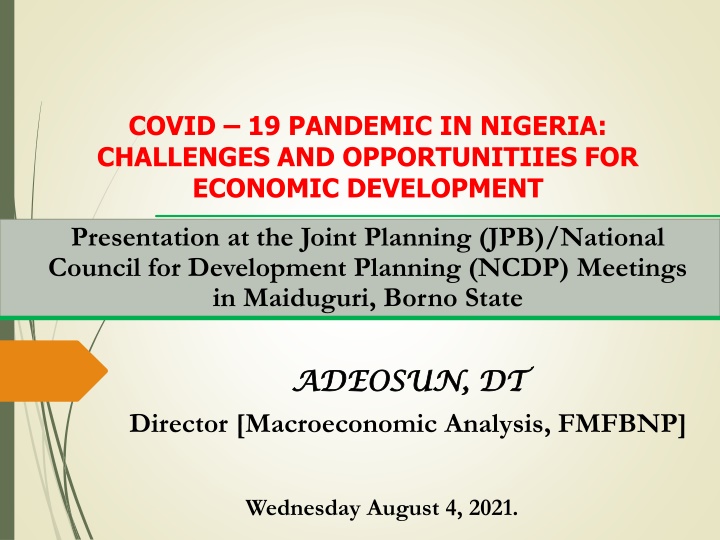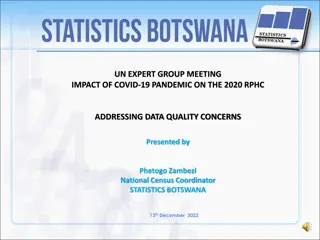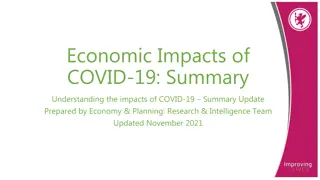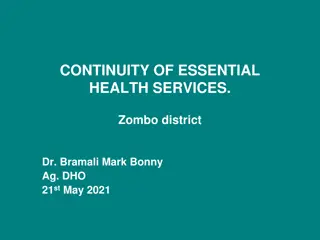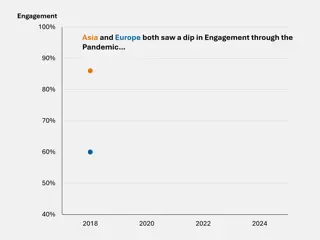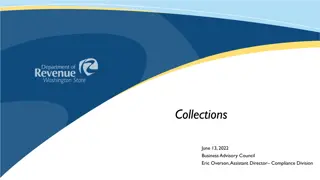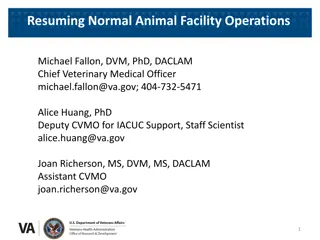Challenges and Opportunities for Economic Development Amid COVID-19 Pandemic in Nigeria
The COVID-19 pandemic has significantly impacted Nigeria's economy, leading to challenges such as total lockdowns, loss of income, and unemployment. Despite this, there are opportunities for economic development that can be explored post-pandemic. This presentation discusses the challenges faced and potential opportunities for economic growth in Nigeria.
Download Presentation

Please find below an Image/Link to download the presentation.
The content on the website is provided AS IS for your information and personal use only. It may not be sold, licensed, or shared on other websites without obtaining consent from the author.If you encounter any issues during the download, it is possible that the publisher has removed the file from their server.
You are allowed to download the files provided on this website for personal or commercial use, subject to the condition that they are used lawfully. All files are the property of their respective owners.
The content on the website is provided AS IS for your information and personal use only. It may not be sold, licensed, or shared on other websites without obtaining consent from the author.
E N D
Presentation Transcript
COVID 19 PANDEMIC IN NIGERIA: CHALLENGES AND OPPORTUNITIIES FOR ECONOMIC DEVELOPMENT Presentation at the Joint Planning (JPB)/National Council for Development Planning (NCDP) Meetings in Maiduguri, Borno State ADEOSUN, DT ADEOSUN, DT Director [Macroeconomic Analysis, FMFBNP] Wednesday August 4, 2021.
Outline Introduction/Overview Tackling the Covid-19 Pandemic Planning and Plan Implementation during and Post Covid-19 Pandemic Emerging Issues/Challenges Opportunities for Economic Development Conclusion 2
Introduction/Overview The COVID-19 scourge is currently ravaging all sectors of the world economy; The Index case of COVID-19 in Nigeria was on February 27, 2020 by an Italian citizen It has also mutated leading to the third wave of the Delta variant The pandemic has since affected all the 36 States and FCT Resulting in total lockdown of the economies of many countries including Nigeria; Confirmed Cases in Nigeria stood at over 171,324, Recovered 164,798 and Death 2,134 as at July, 2021 It paralyzed economic activities and loss of income by households and businesses
Introduction/Overview /2 There has been a global shutdown in virtually every area of manufacturing, services and commerce Non-oil revenue, largely made up of taxes, has also practically dried up. The result is crippling business losses and increasing unemployment on account of layoffs in virtually all sectors of the economy 4
Demand for crude oil and related products plummeted to the lowest price of crude oil in over 2 decades to as low as $25 for Brent crude. This made the implementation of the country s 2020 budget with oil benchmark of $57 per barrel, difficult Necessitating a review of the budget. No doubt, the COVID-19 pandemic has severely impacted growth across all sectors of the economy. Introduction/ Overview /3
Introduction/Overview /4 Nigeria s Economy slipped into recession as oil prices plunged in the midst of the COVID-19 Pandemic The GDP contracted by 3.62 percent Year-on Year in real terms in the third Quarter of 2020 Government however took some pro-active and effective initiatives to contain the spread of the Pandemic Nigeria therefore exited the V shaped recession in the first Quarter of 2021and resumed growth albeit slowly from Q1 to date 6
Tackling COVID-19 Pandemic The Federal and the Sub-national governments took some actions in a bid to curtail the spread of COVID-19 Pandemic: These actions include: - Restriction of movements within and out of cities - Lockdown of Airports and outlawing international passenger flights; - Encouraging citizens to remain at home; - Closing of markets (except for essentials), business places and offices; - Stopping of all forms of social and cultural - Social distancing - Wearing of face masks and use of hand sanitizers; - General lock down of economy, among others gatherings; 7
Challenges of COVID-19 Pandemic Health Sector:The deplorable state of the country s health institutions/system has become apparent and was impacted negatively. This has brought to the fore, the need for huge investment to save the sector and citizens from attendant consequences of poor health infrastructure; Trade:The country s major trade partners have been the United States, China, Europe etc. which have been severely affected by the pandemic. The spillover effect on Nigeria s external trade balance is not palatable; Oil & Gas: Exports earnings fro Oil and Gas declined due to low demand. Collapsed in crude oil price at the international market (declined to as low as $20/pb. 8
Challenges of COVID-19 Pandemic Aviation: This sector was greatly impacted, as most countries shut down their airspace to stop the spread of the virus; Low Revenue: Due to the decline in crude oil prices, the country lost huge sum of revenue which affected funding of other sectors particularly critical capital projects; Poverty: The focus of the Mr. President to take 100 million Nigerians out of poverty within 10 years may suffer some set back if the situation fails to improve. 9
Challenges of Covid-19 on the Nigerian Economy../2 Implication Impact Disruption in Global supply Chains Slowdown in economic growth Inadequate raw materials for production Scarcity of machinery & equipment by factories Rise in general price level [cost push inflation] MSME in serious cost pressure Potential closure of businesses [Job losses] Reduction in OPEC Quota 1.4mbpd Decline in crude oil price falling below US$20pb FOREX earnings decline Exchange rate depreciation [currency devaluation] Reduction in Govt Revenue Depletion of Foreign Reserves Rising deficit Mounting debt Fiscal crisis at both FG and State levels Lower demand in Global markets for Crude oil
Challenges of Covid-19 on the Nigerian Economy../3 Decline in Output / Lower Productivity Significant reduction in economic activities Disruption in the delivery of goods and services Disruption of Govt, corporate and individual activities Youth restiveness and insecurity (Rise in social vices) Potential famine Huge food security challenge Restricted movement of people due to travel bans (Road, Rail, Water and Air travels) Cancellation of foreign investment Partial or complete pause in construction works Loss of investors confidence Reduction in loanable funds Pressure on Interest rates Reduced Diasporan Annual Remittances from $25billion to Disruption in FDI and Capital flow
Post COVID-19 Planning and Plan Implementation The impact of Covid-19 has made consistent planning more imperative This is the more reason why the current effort of government in developing Successor Plans to NV20:2020 and ERGP 2017-2020 is expedient Consistent Planning and Plan implementation helps to address issues such as: 1) Poverty and Inequality: Break the vicious cycle of poverty arising from low productivity and high propensity to consume; Create jobs and address underemployment, which is a common feature of developing countries; Close or reduce the gap between the rich and the poor 2) Infrastructure Deficit: Accelerate infrastructural development and harnessing its spillover effect for economic development; 12
Post COVID-19 Planning & Plan Implementation../2 Accelerate Growth in the Real Sector: Agric sector can be transformed into a major source of raw material for the industrial sector 4) Economic Development: Address foreign trade imbalance, particularly, with nations involved in primary product Facilitate inter and intra trades within and across states of the federation 5) Ensure Balanced Development in the Economy: With appropriate model, helps in resource allocation to sectors and also facilitate the opening of other sectors. Redirecting investments to achieve maximum growth Alignment of plans between Federal & State governments 13
Post COVID-19 Planning and Plan Implementation../3 Ensure Balanced Development in the Economy: Planning with appropriate model helps in resource allocation to sectors to reduce over- concentration and facilitate the opening of other sectors. Achieving maximum economic growth by redirecting investments in regions and areas with natural resources and development potentials Improving the living, economic and social conditions in backward and deprived regions/States. 14
Emerging Issues The COVID-19 outbreak has thrown up a lot of issues: Inadequate health infrastructure Problems of monolithic economy depending on crude oil as the major source of export revenue Problem of identity management & registration Palliatives and stimulus packages for the vulnerable (including cash) were being distributed without adequate data. Deployment of ICT Structure of the Nigerian economy. 15
Opportunities for Economic Development o Major reforms to boost the economy, especially, on the revenue aspect that has been the main issue of concern even before the outbreak of the Covid-19 pandemic; and Government Intervention: o The most vulnerable households need to be catered for and be captured in a database for easy access for administering government s palliatives 16
Opportunities for Economic Development Improving the health sector: The state of the country s health sector needs urgent attention. Adequate funding and deliberate policies should be implemented by the different tiers of government. Financial Stimulus and safety nets: Through targeted tax incentives, social transfers and regulatory support, most vulnerable businesses and citizens can thrive even after the pandemic; Help sub-national governments: The Federal govt and States need to collaborate to improve health sector and reduce medical tourism. 17
Opportunities for Economic Devt../2 Reduce cost of Governance: There should be a reduction on the recurrent side of the government spending to make more funds available to critical sectors that will drive the economy to growth path, in the same vein, all government activities should be made transparent with good accountability and adequate utilization of available resources. 18
Opportunities for Economic Devt../2 State of Emergency on Revenue Generation: This is the right time to declare this to all revenue generating agencies of government, as the government need her revenues to be equal to face the imminent recession ahead. Improving Monetary Policy: The CBN should maintain stable foreign exchange (FOREX, lower interest rate and banks reserve ratio to make money available to Small and Medium Scale Enterprises (SMEs). 19
Opportunities for Economic Devt/3 Increased Sectoral Investment: Need for increased investment by public and private sectors in Agriculture, infrastructure, Mines and Steel developments, human capital etc. Diversification: The increased spending will lead to gains in a diversified economy from the mono product economy and leading the country towards sustainable growth path. 20
Opportunities for Economic Devt/3 Harnessing Opportunities in ICT: The Covid-19 new normal has opened up opportunities in the ICT sector. Meetings are held virtually and saving unquantifiable resources usually expended in attending in-person meetings. Even when other sectors of the economy performed poorly, the ICT sector grew during the pandemic. 21
